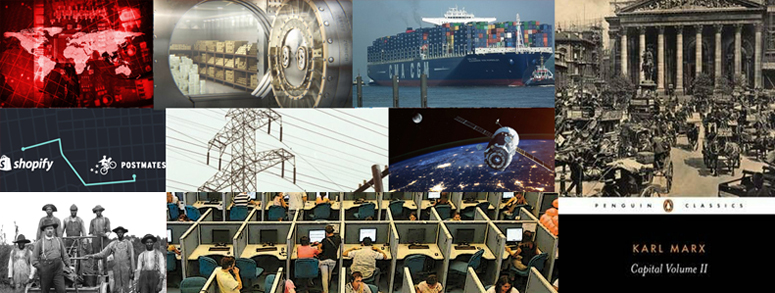
- This event has passed.
Capital, Volume 2, Second Sessions

Volume I of Capital is just the beginning of unraveling the underlying laws of capitalist development. The ground is then laid in combining the laws of motion peculiar to capitalism uncovered in the first two Volumes—The Process of Capitalist Production and The Process of the Circulation of Capital—to the analysis of the third Volume, The Process of Capitalist Production as a Whole. Here, the circle is completed and we are able to de-fetishize the machinations that appear on the surface of society and their real relationship to the production of wealth and the circulation of that wealth throughout all the competing capitalist interests and the various branches of capital, and the different strata of the proletariat —prices, wages, interests, rents, dividends, rates of profit, fictitious capital—while revealing the necessity of tendential contradictions that result in episodic crisis of the system leading to periodic booms and busts!
Join us as we journey through this movement from the imaginary concrete to the abstract concrete to the real concrete. Come and challenge your way of thinking and understanding the world as it appears to you and begin to identify some of what needs to be overcome and done to bring about a better world.
The CAPITAL STUDIES GROUP has been meeting on Saturdays for more than two years. We are a group of workers, students, activists and teachers who have dedicated themselves to a chronological reading of all three volumes of Marx’s Capital. Newcomers are encouraged to join when your schedule permits.
Admissions are sliding scale. No one is ever excluded for inability to pay.
From Sam, one of the conveners of the group. Very relevant for all those who will participate, whether starting in now or have been part of the group from whatever point in this study:
“The past few chapters have been about the two concepts of Fixed and Circulating Capital:
Fixed Capital: Refers to machines, buildings and other ‘fixed’ parts of constant capital that transfer their value to the product over a long period of time and only bit by bit. For example a machine that is worth 10,000$ and is supposed to last for 10 years, transfers 1000$ every year to the total sum of products produced in that year. Assuming that a 1000 pieces of cloth were produced, it transfers $1.00 each.
Circulating Capital: Refers to labor-power (variable capital) and raw materials (part of constant capital). They transfer all their value to product. If 1000$ in wages are paid over a month and some 100 pieces of cloth are produced in that month, each piece will represent $10 etc.
Three points to be made:
1) Fixed and Circulating Capital refer to the division of capital in the production sphere and not the circulation sphere. Marx spends a lot of time castigating Adam Smith for his confusion of Commodity Capital with Circulating Capital.
2) Although they are concepts of the production sphere, they are derived at from the standpoint of circulation of value. This is in opposition to the categories of Constant and Variable Capital (Volume 1) which are from the standpoint of the production of value (look carefully at the titles of volume one and two).
3) This is the standpoint of the critique of political economy: Machines are not fixed capital by themselves nor are wages and raw materials circulating capital, it is only under the capitalist relations of production i.e. value relations that machines become the embodiment of fixed capital and, wages and raw materials the embodiment of circulating capital. By itself a machine is just a machine, being fixed capital is its social character. Remember Marx from Volume 1:
“Not an atom of matter enters into the objectivity of commodities as values; in this it is the direct opposite of the coarsely sensuous objectivity of commodities as physical objects. We may twist and turn a single commodity as we wish; it remains impossible to grasp it as a thing possessing value. However, let us remember that commodities possess an objective character as values only in so far as they are all expressions of an identical social substance, human labour, that their objective character as values is therefore purely social” (p. 138-9).”
Next Marx goes into turn over time and the tendencies it creates the result of which is what we call globalization’
